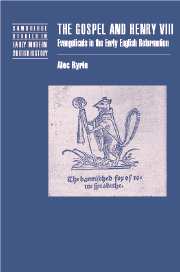Book contents
- Frontmatter
- Contents
- List of figures
- List of tables
- Acknowledgements
- Notes on the text
- List of abbreviations
- Introduction
- Part I The regime and the reformers
- Part II The faces of reform
- 3 The exiles
- 4 Pulpit and printshop
- 5 The universities
- 6 The court
- 7 The evangelical underground
- Conclusion
- Appendixes
- Bibliography
- Index
5 - The universities
Published online by Cambridge University Press: 24 July 2009
- Frontmatter
- Contents
- List of figures
- List of tables
- Acknowledgements
- Notes on the text
- List of abbreviations
- Introduction
- Part I The regime and the reformers
- Part II The faces of reform
- 3 The exiles
- 4 Pulpit and printshop
- 5 The universities
- 6 The court
- 7 The evangelical underground
- Conclusion
- Appendixes
- Bibliography
- Index
Summary
For the Jewes requyre a sygne, and the Grekes seke after wysdome. But we preache Christ crucifyed, vnto the Jewes an occasyon of fallynge, and vnto the Grekes foolysshnes.
I Corinthians 1:22–3GODLINESS AND GOOD LEARNING
The Reformation was perceived by those who made it, and by those who were made by it, as an intellectual event. Nowadays we are interested in ‘popular religion’ and the religious culture of the unlearned, but this preoccupation would have bemused most of the religious reformers of the sixteenth century – including many outside the elites. It is worth emphasising the extent to which, in the early sixteenth century, learning was next to godliness. A Lutheran catechetical dialogue which was translated into English in 1545 provides a typical example. One of the characters, the ‘unlearned man’, begins with a soliloquy in praise of the learning he lacks:
Whan I do considre with my selfe (ryght gentle neyghbours) how many greate, learned, wyse, and connynge men there be in the worlde, vnto whome the knowledge of the truthe is so plentuously opened, so that they knowe at large what is neadfull & necessary to theyr saluacyon: I can not otherwyse thynke but that all suche learned men muste neades haue here vpon earth an heauenly treasure, & an ouerflowinge fownteyne, out of the whiche they may at all tymes featche all suche thinges as theyr hartes can desyre, beynge neadefull and necessary to theyr soules healthe.
- Type
- Chapter
- Information
- The Gospel and Henry VIIIEvangelicals in the Early English Reformation, pp. 157 - 193Publisher: Cambridge University PressPrint publication year: 2003
- 1
- Cited by



